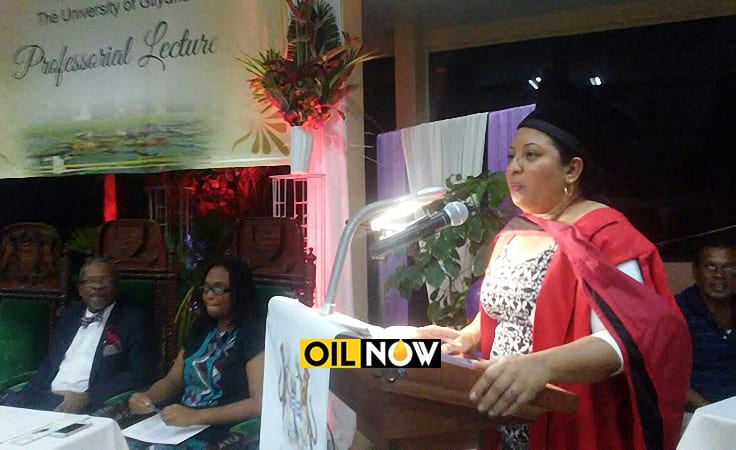It is incumbent on the Guyanese people to use its fear of foreign conglomerates such as the oil companies currently exploring offshore to become adaptive in order to seek out the relevant information to garner a better understanding of precisely what is happening in the industry in order to avoid future conflicts in light of historical racial tensions.
These were among the views expressed by Deputy Vice Chancellor, Philanthropy, Alumni and Civic Engagement (PACE), University of Guyana, Professor Paloma Mohamed-Martin.
She was at the time delivering the final Professorial Lecture to be hosted by the University for 2017, at its Turkeyen Campus.
Recently elevated to the status of Professor – from that of Doctor – Mohamed-Martin was adamant that in light of the complexities of the Guyanese society the prospect of oil revenues do present a challenge to the fulfillment of the ‘One Destiny’ as espoused in the National Motto.
Oil revenue presents an environment ripe for conflict if not confronted correctly, she said.
According to Professor Mohamed-Martin, she is not in any way calling for the country and its people to get rid of the large oil companies operating in Guyana out of fear, but rather, “what I am espousing is that we allow the fear to be adaptive, that fear should lead us to seek information, stand up and take notice…fear should let us understand and find out what our national destiny is and we should find it and not arrogate that responsibility.”
Addressing several members of Guyanese Academia and industry stakeholders at the Education Lecture Theatre, at the Turkeyen Campus, Professor Mohamed-Martin insisted, “If we get involved, we understand what is happening then the fear tends to dissipate…wake up, grow, up think through, work hard and seize this moment, make it work for our people,” Dr. Mohamed-Martin said during her almost two hours long interaction.
Delving into her Lecture, ‘The Fear Factor; Race, Oil and Reforming Guyana’ the University’s Deputy Vice Chancellor juxtaposed the traditional ‘racial’ divide that has existed in Guyana, alongside the fortunes of oil revenues and its potential for social conflict and upheaval as a result.
According to the University Professor, the construct of race and racism in Guyana and across the world has only ever served the elite, adding that the competition for access to resources by competing groups can and has led to hostility in countries.
She reminded that this potential for conflict has been exacerbated in countries following the discovery of oil.
“My examination of race in Guyana supports the thesis that race in itself does not exist for its own ends…it is constructed and perpetuated to serve the material and psychological interests of groups,” she stated.
Addressing Guyana’s race relations problems in light of the prospect of oil, Professor Mohamed-Martins questioned, “why should it be that so many natural resources in this country should see my country with any population that is not cared for that is not provided for and that is not productive…what is wrong, how can this be fixed.”
She was adamant that in this juncture of Guyana’s history, “pregnant with promise of wealth it is crucial to engage in discussions and their solutions directly.”
The UG Deputy Vice Chancellor, in questioning “what does oil have to do with our destiny” recalled that the international oil companies making large investments in Guyana will require stability.
“The presence of oil in a country can have major benefits and it does not automatically lead to the oil curse but if not managed properly or efficiently by the host government the massive influx of oil revenues can distort a country’s economic fundamentals, fuel corruption, create conditions that trigger conflict. Countries with oil are twice as likely to experience civil war as those without oil,” she pointed out.
It was noted that there exists a direct relationship between acute corruption and violence which in some parts of the world has escalated to the stage of posing an international security challenge.
Speaking to the fears that exist in society which will inherently be compounded with the revenues from oil, Professor Mohamed-Martin encouraged a national dialogue in order to confront the existing ‘racial’ tensions ahead of the prospects of oil wealth.



